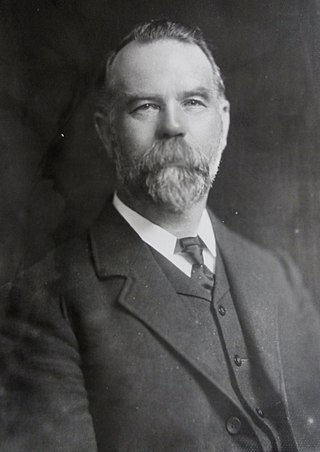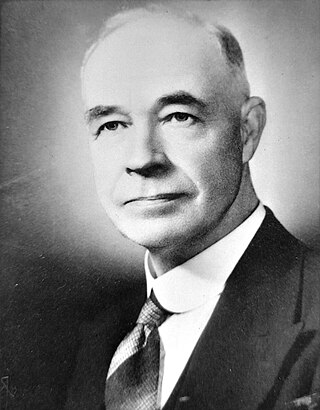
Sir Francis Joseph Kitts was a New Zealand politician. Originally from the South Island, he served in the military and later was a civil servant before entering politics with the Labour Party. He was the Member of Parliament for Wellington Central between 1954 and 1960. He was also the longest-serving Mayor of Wellington, holding the post from 1956 to 1974. He was also a member at various times of several other local bodies and was still an elected official at his death.

Sir William Appleton was a New Zealand local body politician, advertising agent and leading company director. He was Mayor of Wellington for two terms from 1944 to 1950 after serving as a city councillor from 1931 to 1944. He was knighted in 1950.

Sir Robert Lachlan Macalister was the Mayor of Wellington from 1950 to 1956, and had been the acting mayor for five months in 1948 during the absence overseas of Will Appleton.
The 1915 Wellington City mayoral election was part of the New Zealand local elections held that same year. In 1915, elections were held for the Mayor of Wellington plus other local government positions including fifteen city councillors. John Luke, the incumbent Mayor, retained office tallying just ten votes fewer than he did two years earlier. The standard first-past-the-post electoral method was used to conduct polling.

The 1917 Wellington City mayoral election was part of the New Zealand local elections held that same year. In 1917, elections were held for the Mayor of Wellington plus other local government positions including fifteen city councillors, also elected biannually. The polling was conducted using the standard first-past-the-post electoral method.

William James Gaudin was a New Zealand merchant and politician.

The 1933 Wellington City mayoral election was part of the New Zealand local elections held that same year. In 1933, elections were held for the Mayor of Wellington plus other local government positions including the fifteen city councillors, also elected biannually. Thomas Hislop, the incumbent Mayor sought re-election and retained office unopposed with no other candidates emerging. The polling was conducted using the standard first-past-the-post electoral method.

The 1941 Wellington City mayoral election was part of the New Zealand local elections held that same year. In 1941, elections were held for the Mayor of Wellington and fifteen city councillors plus seats on the Wellington Hospital Board and Wellington Harbour Board. The polling was conducted using the standard first-past-the-post electoral method.

The 1944 Wellington City mayoral election was part of the New Zealand local elections held that same year. In 1944, election were held for the Mayor of Wellington plus other local government positions including fifteen city councillors. The polling was conducted using the standard first-past-the-post electoral method.
The Wellington Citizens' Association, was a right-leaning local body electoral ticket in Wellington, New Zealand. It was formed in 1911 by merging the selection process of council candidates of several civic interest groups and business lobby groups. Its main ambitions were to continue to control the Wellington City Council, reduce local spending and deny left-leaning Labour Party candidates being elected.

Ernest Richard Toop was a New Zealand politician and businessman.

The 1950 Wellington City mayoral election was part of the New Zealand local elections held that same year. In 1950, elections were held for the Mayor of Wellington plus other local government positions including fifteen city councillors. The polling was conducted using the standard first-past-the-post electoral method.

The 1956 Wellington City mayoral election was part of the New Zealand local elections held that same year. In 1956, elections were held for the Mayor of Wellington plus other local government positions including fifteen city councillors. The polling was conducted using the standard first-past-the-post electoral method.

The 1959 Wellington City mayoral election was part of the New Zealand local elections held that same year. In 1959, elections were held for the Mayor of Wellington plus other local government positions including fifteen city councillors. The polling was conducted using the standard first-past-the-post electoral method.

The 1965 Wellington City mayoral election was part of the New Zealand local elections held that same year. In 1965, elections were held for the Mayor of Wellington plus other local government positions including fifteen city councillors. The polling was conducted using the standard first-past-the-post electoral method.

Sir John Francis Jeffries was a New Zealand local politician, civil servant and later a judge of the High Court.

For the Canadian–American screenwriter and producer, see Denis McGrath.

Martin Maxwell Fleming Luckie was a New Zealand cricketer who played two matches of first-class cricket 29 years apart – one in 1891 and the other in 1920. He became a prominent cricket administrator and a city councillor in Wellington. He was twice deputy mayor: from 1929 to 1931, and again from 1936 to 1947.

John Gibbs Churchill was a New Zealand trade unionist and local politician. For six years he was the mayor of Otaki.
The Lower Hutt Citizens' Association, was a right-leaning local body electoral ticket in Lower Hutt, New Zealand. It was formed in 1945 by merging the selection process of council candidates of several civic interest groups and business lobby groups. Its main ambitions were to continue to control the Lower Hutt City Council, reduce local spending and deny left-leaning Labour Party candidates election.













